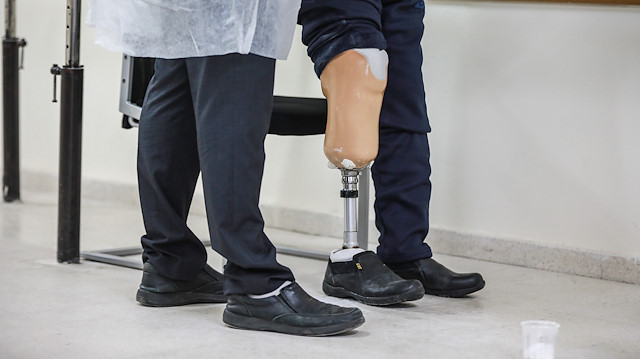
The UN said Thursday that people with disabilities are among the most vulnerable groups amid the coronavirus pandemic and are often ignored during emergencies such as pandemics.
In 1992, the UN declared Dec. 3 the International Day of Persons with Disabilities (IDPD) to draw attention to the rights of people with disabilities, the difficulties in their lives, and solutions for their problems.
The UN defines handicapped persons as “those who have long-term physical, mental, intellectual or sensory impairments which in interaction with various barriers may hinder their full and effective participation in society on an equal basis with others.”
The theme of IDPD is “Building Back Better: toward a disability-inclusive, accessible and sustainable post COVID-19 World” in order for the full and equal participation of people with disabilities in all parts of society and taking action to involve them in development.
Every one out of seven people in the world, or over 1 billion people, maintain their lives with a disability, according to the UN, with 80% of the handicapped population living in developing countries.
It is estimated that 46% of the population above the age of 60 have disabilities. While one woman out of five will have a disability in their lives, one out of 10 children are disabled.
The World Health Organization (WHO) has highlighted the increasing understanding that disabilities are a part of being human. They emphasize that everyone will have a permanent or temporary disability at some point in their lives, but very few countries have sufficient mechanisms to fully respond to the needs of people with disabilities.
The WHO says that nearly 190 million people with a disability above the age of 15 encounter serious difficulties and need healthcare services. It predicts that the population of handicapped will rise as the general population grows old and chronic health conditions increase.
People with disabilities have less access to healthcare services than others and therefore their health and care needs are not met sufficiently. Healthcare services for them are usually of poor quality and inadequate, the WHO says, adding the number and quality of primary healthcare services and rehabilitation programs must be increased quickly.
- Impact of COVID-19 crisis on people with disabilities
Handicapped people are among the most affected by the COVID-19 pandemic, according to the UN.
People with disabilities are more vulnerable to the COVID-19 threat and have a higher risk of being infected.
Handicapped people have difficulties in taking the most important precautions against the virus such as washing their hands, observing social distancing and complying with local healthcare rules.
Most of the time, water, sanitation and hygiene facilities are not accessible for the handicapped. It becomes impossible for them to observe social distancing while requiring physical contact for receiving support.
Access to healthcare services is of critical significance for people with disabilities since they are more vulnerable to extremely dangerous secondary conditions and associated diseases such as lung problems, diabetes, heart disease and obesity.
Even before the pandemic, every one out of three handicapped people could not access health and care services.
The risk of infection with COVID-19 increases even more in nursing homes, where especially handicapped senior citizens live.
People with disabilities also lose their jobs during the pandemic.
*Writing by Dilan Pamuk in Ankara














